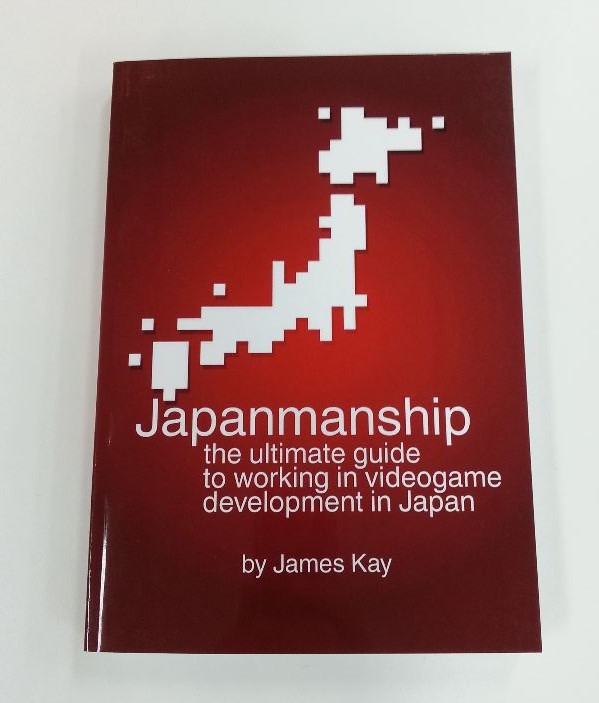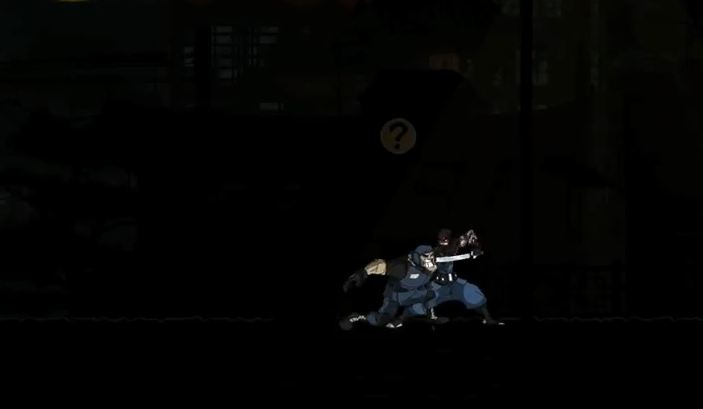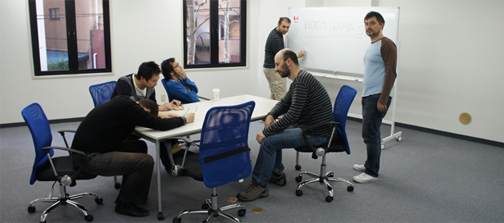
Dutch-British game developer James Kay found his way into the videogame industry after studying Audiovisual design at the Willem de Kooning Academy and moving to London to work at Intelligent Games and Criterion Software. He relocated to Japan in 2001 and, after picking up a wealth of experience at companies including Taito, Genki and Marvelous Entertainment, went on to co-found Score Studios, a company that has received critical acclaim and is fast becoming a big name in the industry.
Detailing the many hurdles that foreigners working in the Japanese videogame industry face, James’ book Japanmanship: the ultimate guide to working in videogame development in Japan may well prove to be an invaluable resource for those thinking of making the move to the spiritual home of videogames.
With the book coming off the presses just last December, RocketNews24 headed to Score Studios in Tokyo’s Yoyogi to meet with James and talk about his book, life in the videogame industry and which Nintendo Princess he’d rather rescue.
Entering Score Studios’ meeting-cum-playroom, I marvelled at the impressive collection of consoles, both old and new, and videogame memorabilia. It’s clear as soon as you walk into the room that Score is in the games business for its members’ love of games rather than just the money. Spotting a slightly worn copy of the original Super Mario Kart on a coffee table to my right and making a mental note to ask for a quick go of it later on, I sat down with coffee-sipping James Kay to talk about his own personal creation.
So what made you want to write a book in the first place?
I used to keep a blog on the subject of working in the games industry in Japan, mostly because I wanted to write and share my experiences, but it was also a lot of fun to do. I didn’t publicise it that much, but – perhaps mainly because of the subject matter – people liked it and my readership grew. As time went by I found myself too busy to provide regular updates and so brought it to a close, but at the same time I felt it was a shame, especially since I know that some people found it very useful; I’ve met people in Japan who made their own way here and who used to read the blog. So Japanmanship is more or less the informative stuff from the blog, collated and rewritten, in one handy set of pages.
Who is the book primarily aimed at?
Though I think it could be useful to a lesser extend to anyone who is thinking of working in Japan, it’s mainly aimed at people who want to work in videogame development here; mostly students or young professionals who feel strongly about Japan and the profession and could do with some extra information before setting out on their adventure.
James keeping it real with a glass of red

It’s often said that no matter how long a foreigner lives and works in Japan, they’ll forever be viewed as an outside or a visitor. Do you think there’s any truth to that?
That’s absolutely true, and it’s fine. If you intend to fully integrate you’re in for a shock and a lot of frustration. I’ve seen it happen, and those expats usually end up moving back home bitter and disappointed. You’ll never be Japanese so relax! In fact, not having to conform to some of the expectations Japanese people labour under is actually a blessing! It’d be nice if we’d be treated more as equals in some areas, but it’s hardly a burden. That is, for Westerners, of course; I gather Asian immigrants here have a much tougher time of it, but I’m not really qualified to comment on that.
You touch on the subject of otaku in your book. Is Japan really the nerd haven that many westerners believe it to be? Moreover, would you say that it’s easier to be “accepted” as an otaku over here?
Sure, within reason. All the toys, manga and games you could ever wish for are readily available here in Japan, and you won’t necessarily be looked down upon as a grown man engaging in these hobbies. But, like everywhere, you can take it to the extreme and have people look at you askance.
Before we learn a little more about how you got into the industry, could you indulge us in a little videogame prattle for a while?
By all means!
What’s your first videogame memory?
I’ve engaged in copying code from books and magazines from a young age as well as – probably mostly, even – drawing and doing art in my dad’s work copy of AutoCAD, but my first “proper” videogame memory is maybe Munch Man on the TI-99A. A nice, clunky cartridge! We also borrowed Parsec from a neighbour, and it just blew my mind.
And which gaming gems are tickling your fancy more recently?
A lot of things, and nothing! I find it hard to get into games for the long haul these days, so I skim a few and flutter from 3DS to PSVita to PS3 to iPad… The last game I sank too much time in was Skyrim, but I’ve really been enjoying Pushmo and Crashmo on the 3DS, Mark of the Ninja on PC, and Triple Town on my phone.
▼Klei Entertainment’s Mark of the Ninja proves that 2-D can still cut it
Any all-time favourite games?
It’d have to be Tetris.
If you have any high scores to brag about now’s your chance!
Game B, level 9 on the original Gameboy version was routinely cleared, and I once – in short bursts over several days – kept a single game going for over 24 hours total on my mobile phone. After Tetris, my next love is Super Puzzle Fighter 2 Turbo. I think there might be a bit of a pattern emerging here haha! That being said, The Legend of Zelda: A Link to the Past on the SNES is probably the game I’ve played and cleared most times in my life.
Oh, so you were more of a Nintendo kid than Sega?
A PC one, actually. Ultima, King’s Quest, Wolfenstein; they were the kind of things I was into.
Oh, I can still answer that, don’t worry! It’s got to be Toad for me every time.
Who’d you rather rescue, Princess Peach or Princess Zelda?
Zelda. Again…
Even with those elfin ears?
At least she gets out of the house every now and again rather than sitting around waiting to be kidnapped…
Good point. Ryu or Ken?
I don’t really do fighting games to be honest. I always think that mastering fighting games is a lot like learning Dutch: it takes a lot of effort to acquire a very narrow skill that’s pretty much pointless outside of Holland/the game.
Haha
I’m half Dutch, so I’m allowed to say that!
Moving on! What was the first game you worked on professionally?
It was a realistic golf game for the PC and Playstation 1 that nobody ever heard of. I had to process and clean up digitised footage of all these real-life golf celebrities, some of whom I helped film, too. As a first development experience it was pretty great! The publisher was just on its way down at the time so there was almost no marketing budget, which meant that it languished in obscurity, sadly.
▼The boys at Score Studios do a little brainstorming
So when did Score Studios come into being?
Well, after working in the Japanese industry for quite a while I got a little frustrated at my inability to effect change. I met Paul Caristino and we figured we were both on the same page. We took the plunge and created Score Studios, to try and do things “our way”, inject a little Western chutzpah, so to speak. We put in our own cash, and worked hard, but slowly we managed to grow and make other people see that we had something special going on. In the early days we did a few iOS titles, because the bar to entry was nice and low for independent developers, and had some modest critical success with Piczle Lines, and a tool Paul wanted to make for his own D&D sessions, DM Tools, but these days we’re back doing console game development, something everybody at Score is pretty much at home in.
Piczle Lines has become a firm favourite with puzzle fans across the globe:
Any big names you can drop on us? Who has Score worked with to date?
We’ve worked with a few Japanese companies, like Valhalla Games Studios, for example, but are now pretty much entirely committed to a contract that is very exciting for us, but not anything we can really discuss, sorry.
Not even a tiny hint?
I’m sworn to secrecy, sorry!
Fair enough! Finally, then, do you have any advice for any of our readers who are interested in getting into the Japanese games industry?
Yeah, buy my book, haha! But seriously, I know it sounds a little far-fetched – the whole idea of moving to Japan to work in videogame development, I mean – but it’s not so crazy. In fact, I see more and more foreigners doing exactly that. So if it’s what you really want to do, then go for it!
For more on Score Studios and James’ book, head over to the official Japanmanship page on Score’s website.
Photos / video courtesy of James Kay / Score Studios



 Acronyms and in-jokes: The origins of your favourite Japanese video game companies’ names
Acronyms and in-jokes: The origins of your favourite Japanese video game companies’ names FFXV director Hajime Tabata talks leaving Square Enix to make the first Paralympic game【Interview】
FFXV director Hajime Tabata talks leaving Square Enix to make the first Paralympic game【Interview】 A talk with the man who helped bring Studio Ghibli to the west, Steve Alpert【Interview】
A talk with the man who helped bring Studio Ghibli to the west, Steve Alpert【Interview】 Ayato Nikukyu, one of Japan’s hottest cosplayers, visits RocketNews24 for an exclusive interview
Ayato Nikukyu, one of Japan’s hottest cosplayers, visits RocketNews24 for an exclusive interview Hayao Miyazaki gives interview on Earwig and the Witch, praises use of CG and son’s skills【Video】
Hayao Miyazaki gives interview on Earwig and the Witch, praises use of CG and son’s skills【Video】 Japan Extreme Budget Travel! A trip from Tokyo to Izumo for just 30,000 yen [Part 1]
Japan Extreme Budget Travel! A trip from Tokyo to Izumo for just 30,000 yen [Part 1] Japan has only one airport named after a samurai, so let’s check out Kochi Ryoma【Photos】
Japan has only one airport named after a samurai, so let’s check out Kochi Ryoma【Photos】 Foreign tourists in Japan will get free Shinkansen tickets to promote regional tourism
Foreign tourists in Japan will get free Shinkansen tickets to promote regional tourism ‘A Cruel Angel’s Thesis’ took just two hours to write says Evangelion lyricist Neko Oikawa
‘A Cruel Angel’s Thesis’ took just two hours to write says Evangelion lyricist Neko Oikawa The results are in! One Piece World Top 100 characters chosen in global poll
The results are in! One Piece World Top 100 characters chosen in global poll Why Sensoji temple in Asakusa is better at night
Why Sensoji temple in Asakusa is better at night 7-Eleven Japan’s sakura sweets season is underway right now!
7-Eleven Japan’s sakura sweets season is underway right now! Pikachu donuts set to return to Mister Donut, bringing new Pokémon sweets and merch too
Pikachu donuts set to return to Mister Donut, bringing new Pokémon sweets and merch too Extreme Budget Travel! Can you do a trip to Manila with 50,000 yen (US$333)? – Part 1
Extreme Budget Travel! Can you do a trip to Manila with 50,000 yen (US$333)? – Part 1 Can you make a good chicken ramen broth with KFC fried chicken?
Can you make a good chicken ramen broth with KFC fried chicken? The 10 most annoying things foreign tourists do on Japanese trains, according to locals
The 10 most annoying things foreign tourists do on Japanese trains, according to locals Starbucks Japan releases new sakura goods and drinkware for cherry blossom season 2026
Starbucks Japan releases new sakura goods and drinkware for cherry blossom season 2026 Is Sapporio’s Snow Festival awesome enough to be worth visiting even if you hate the snow? [Pics]
Is Sapporio’s Snow Festival awesome enough to be worth visiting even if you hate the snow? [Pics] Japan has trams that say “sorry” while they ride around town…but why?
Japan has trams that say “sorry” while they ride around town…but why? Tokyo Skytree turns pink for the cherry blossom season
Tokyo Skytree turns pink for the cherry blossom season Highest Starbucks in Japan set to open this spring in the Tokyo sky
Highest Starbucks in Japan set to open this spring in the Tokyo sky Japan’s new “Cunte” contact lenses aren’t pronounced like you’re probably thinking they are
Japan’s new “Cunte” contact lenses aren’t pronounced like you’re probably thinking they are Shibuya Station’s Hachiko Gate and Yamanote Line stairway locations change next month
Shibuya Station’s Hachiko Gate and Yamanote Line stairway locations change next month Yakuzen ramen restaurant in Tokyo is very different to a yakuza ramen restaurant
Yakuzen ramen restaurant in Tokyo is very different to a yakuza ramen restaurant Starbucks Japan adds new sakura Frappuccino and cherry blossom drinks to the menu
Starbucks Japan adds new sakura Frappuccino and cherry blossom drinks to the menu Japan’s newest Shinkansen has no seats…or passengers [Video]
Japan’s newest Shinkansen has no seats…or passengers [Video] Foreigners accounting for over 80 percent of off-course skiers needing rescue in Japan’s Hokkaido
Foreigners accounting for over 80 percent of off-course skiers needing rescue in Japan’s Hokkaido Super-salty pizza sends six kids to the hospital in Japan, linguistics blamed
Super-salty pizza sends six kids to the hospital in Japan, linguistics blamed Starbucks Japan unveils new sakura Frappuccino for cherry blossom season 2026
Starbucks Japan unveils new sakura Frappuccino for cherry blossom season 2026 Take a trip to Japan’s Dododo Land, the most irritating place on Earth
Take a trip to Japan’s Dododo Land, the most irritating place on Earth Naruto and Converse team up for new line of shinobi sneakers[Photos]
Naruto and Converse team up for new line of shinobi sneakers[Photos] Is China’s don’t-go-to-Japan warning affecting the lines at a popular Tokyo gyukatsu restaurant?
Is China’s don’t-go-to-Japan warning affecting the lines at a popular Tokyo gyukatsu restaurant? Survey asks foreign tourists what bothered them in Japan, more than half gave same answer
Survey asks foreign tourists what bothered them in Japan, more than half gave same answer Japan’s human washing machines will go on sale to general public, demos to be held in Tokyo
Japan’s human washing machines will go on sale to general public, demos to be held in Tokyo Starbucks Japan releases new drinkware and goods for Valentine’s Day
Starbucks Japan releases new drinkware and goods for Valentine’s Day We deeply regret going into this tunnel on our walk in the mountains of Japan
We deeply regret going into this tunnel on our walk in the mountains of Japan Studio Ghibli releases Kodama forest spirits from Princess Mononoke to light up your home
Studio Ghibli releases Kodama forest spirits from Princess Mononoke to light up your home Major Japanese hotel chain says reservations via overseas booking sites may not be valid
Major Japanese hotel chain says reservations via overseas booking sites may not be valid Put sesame oil in your coffee? Japanese maker says it’s the best way to start your day【Taste test】
Put sesame oil in your coffee? Japanese maker says it’s the best way to start your day【Taste test】 No more using real katana for tourism activities, Japan’s National Police Agency says
No more using real katana for tourism activities, Japan’s National Police Agency says Japanese manga artist makes comic showing one of the most heartbreaking experiences for an author
Japanese manga artist makes comic showing one of the most heartbreaking experiences for an author Author insinuates Hayao Miyazaki isn’t right in the head, says The Wind Rises is full of lies
Author insinuates Hayao Miyazaki isn’t right in the head, says The Wind Rises is full of lies Game of Thrones author George R. R. Martin is collaborating on a Japanese video game
Game of Thrones author George R. R. Martin is collaborating on a Japanese video game Japanese game developer reveals the rags-to-relevance tale behind his mobile JRPG
Japanese game developer reveals the rags-to-relevance tale behind his mobile JRPG Japanese boss finds out employee is moonlighting as light novel author, does something about it
Japanese boss finds out employee is moonlighting as light novel author, does something about it Over 50 percent of single Japanese women in their 20s struggle to make ends meet, survey says
Over 50 percent of single Japanese women in their 20s struggle to make ends meet, survey says We interview voice actress Shoko Nakagawa, learn what gave her the greatest shock of her career
We interview voice actress Shoko Nakagawa, learn what gave her the greatest shock of her career Studio Ghibli producer makes bombshell anime revelations during online Q&A
Studio Ghibli producer makes bombshell anime revelations during online Q&A What’s so special about Japanese swords? We interview master katana maker Norihiro Miyairi!
What’s so special about Japanese swords? We interview master katana maker Norihiro Miyairi! Japanese mom praises hard-studying teenage son…for his Pokémon notes?!?
Japanese mom praises hard-studying teenage son…for his Pokémon notes?!? Mr. Sato accosts award-winning actor Hideaki Ito【Interview】
Mr. Sato accosts award-winning actor Hideaki Ito【Interview】 We interview Japanese comedy duo Yumbo Dump, learn how to make noises with our bellies
We interview Japanese comedy duo Yumbo Dump, learn how to make noises with our bellies Masi Oka and the Everyst team tell us about the art of making manga that exists solely on Twitter
Masi Oka and the Everyst team tell us about the art of making manga that exists solely on Twitter Japanese mom considers cutting off financial support for son who wants to make porn games
Japanese mom considers cutting off financial support for son who wants to make porn games